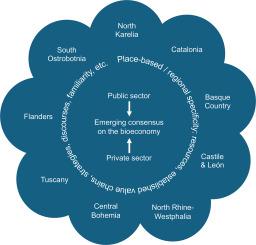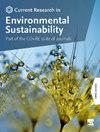打造生物经济:欧洲各地区公共和私营部门的看法
IF 3.7
Q2 ENVIRONMENTAL SCIENCES
Current Research in Environmental Sustainability
Pub Date : 2024-01-01
DOI:10.1016/j.crsust.2024.100264
引用次数: 0
摘要
人们普遍认为生物经济是应对复杂的全球挑战的可行方案,不同的参与者必须通力合作,以创造可持续和有弹性的经济。公共和私营部门分别通过战略、政策和法规、商业选择和投资、创新和市场实施来推动这一转变。本研究通过九个欧洲地区的公共和私营部门参与者对生物经济各组成部分(概念、价值链、效益和风险)的熟悉和理解,探讨了他们对生物经济的看法。这项研究的新颖之处在于评估地区层面对生物经济的理解。这项研究没有强加传统的自上而下的议程,而是根据以各地区语言进行的 534 份调查答复,寻求从业人员的概念。研究使用了描述性统计和摘要统计来探讨数据,随后进行了非参数检验:(1) 对生物经济的讨论是积极的,特别是在自评熟悉程度较高的调查对象中,但这可能与生物经济的实际缺点不一致。(2) 生物经济的实际实施是复杂的。环境效益被认为是生物经济最显著的特点,但受访者也认为社会经济因素很重要。同样,个人风险与社会效益之间也存在矛盾。因此,可持续生物经济必须兼顾环境和社会经济目标以及不同程度的影响。(3) 尽管对生物经济的构成要素正在形成共识,但具体部门的重点领域和地区条件的特殊性阻碍了各地区生物经济的统一性。在制定政策时应考虑到这一点。本文章由计算机程序翻译,如有差异,请以英文原文为准。

Shaping the bioeconomy: Public and private sector perceptions across European regions
The bioeconomy is widely viewed as a viable solution to complex global challenges and diverse actors must collaborate to create sustainable and resilient economies. The public and private sector drive this transformation through strategies, policies, and regulation business choices and investments, innovation and market implementation respectively.
The present study explores perceptions of the bioeconomy among public and private sector actors in nine European regions through the prism of their familiarity and understanding of its constituent parts: concepts, value chains, benefits and risks. The novelty of the research consists in assessing the understanding of the bioeconomy at regional level. Instead of imposing a conventional top-down agenda, it seeks to elicit practitioner conceptualisations, based on 534 survey responses conducted in the respective regional languages. Descriptive and summary statistics were used to explore the data, followed by non-parametric tests.
Key findings are: (1) A positive discourse on the bioeconomy is observed, particularly among survey respondents with high self-rated familiarity, but this may not align with its factual drawbacks. (2) Practical bioeconomy implementation is complex. Environmental benefits are perceived as its most distinguishing feature, yet respondents also consider socioeconomic elements important. Similarly, tensions are observed between personal risks versus societal benefits. Therefore, a sustainable bioeconomy must reconcile environmental and socioeconomic objectives, and different levels of impact. (3) Despite an emerging consensus on the bioeconomy's constituent elements, sector-specific focus areas and regional specificity of conditions prevent uniformity of the bioeconomy across regions. This should be taken into account in policy formulation.
求助全文
通过发布文献求助,成功后即可免费获取论文全文。
去求助
来源期刊

Current Research in Environmental Sustainability
Environmental Science-General Environmental Science
CiteScore
7.50
自引率
9.10%
发文量
76
审稿时长
95 days
 求助内容:
求助内容: 应助结果提醒方式:
应助结果提醒方式:


